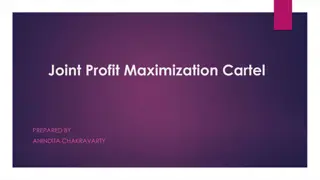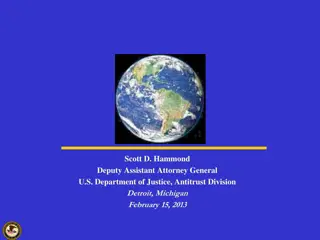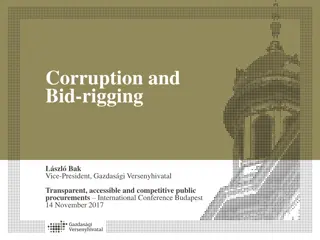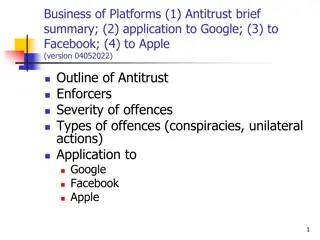Understanding Market Sharing Cartel in Oligopolistic Markets
Market sharing cartels in oligopolistic markets involve firms entering agreements to share the market while retaining some autonomy in their operations. Two main methods are non-price competition and quota systems. Non-price competition involves firms agreeing on a common price to maintain profits w
0 views • 8 slides
Understanding Joint Profit Maximization Cartel
In a joint profit maximization cartel, member firms surrender price and output control to achieve maximum joint profits. The central administrative authority determines output quotas based on cost minimization. The cartel works by aligning industry MR with MC to maximize profits. Advantages include
0 views • 7 slides
Global Impact of Auto Parts Investigation and Cartel Enforcement
The Auto Parts Investigation led by Scott D. Hammond sheds light on the largest criminal antitrust probe, with fines imposed on companies, individuals pleading guilty, and coordination with global enforcers. The investigation uncovered collusion in the auto industry, including price-fixing, bid-rigg
0 views • 21 slides
Quantifying Damages for Direct Purchasers: Methodology Presentation
This presentation by Benoît Durand covers the methodology for quantifying damages in cases involving direct purchasers, including factors like overcharge, passing-on, and lost business effects. It delves into the calculation of total damages and the estimation of overcharges during cartel periods.
0 views • 4 slides
Understanding Corruption and Bid-Rigging in Public Procurements
Explore the terminology, statistics, and possible scenarios of corruption and bid-rigging in public procurements as presented at an international conference in Budapest. The presentation highlights bid-rigging patterns, corruption behaviors, statistics on fines and cartel cases, typical scenarios, a
0 views • 15 slides
Antitrust Overview and Application to Big Tech Companies
Antitrust laws are enforced by agencies like the DoJ, FTC, and European Commission to prevent anti-competitive practices. Violations include conspiracies to fix prices or reduce output and unilateral actions by a single firm. Cartels and conspiracies are illegal, and companies can face severe penalt
0 views • 47 slides





